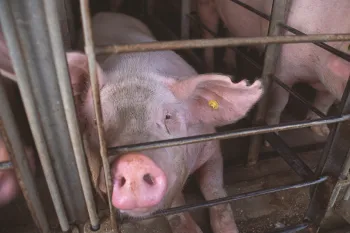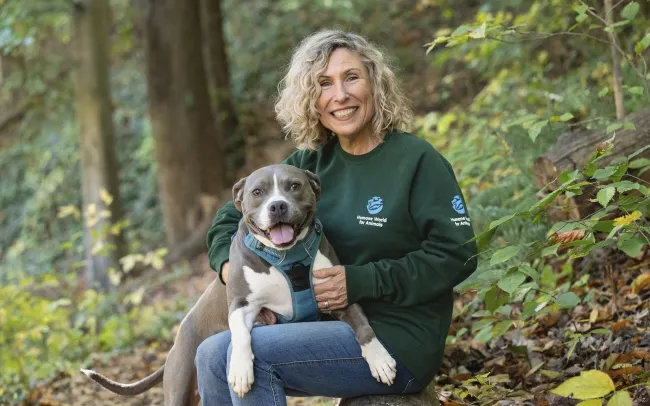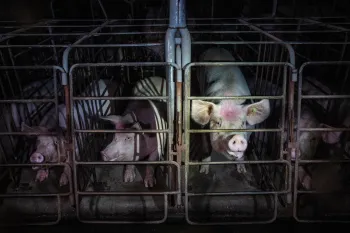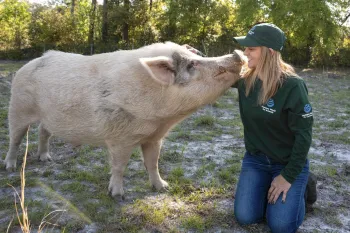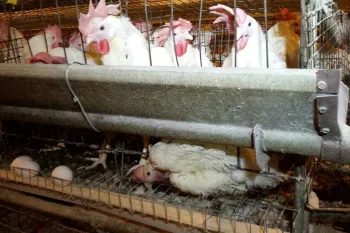In his dystopian novel Animal Farm, George Orwell uses the pig, Squealer, to show how those in power use language, rhetoric and misdirection to spread propaganda, bend the truth and ensure their continued political and social dominance.
Orwell would have had a field day with the July 23 hearing at the U.S. House of Representatives’ Agriculture Committee, which was called “An Examination of the Implications of Proposition 12.”
California’s Proposition 12 is considered a landmark law for farm animals in the U.S. The state’s voters passed the ballot initiative in 2018 with 63% in favor. The law requires that mother pigs, hens used for egg production and calves kept for veal be given enough space to stand up, turn around and extend their limbs. The law also requires that pork, eggs and veal sold in the state be produced without the use of inhumane, extreme confinement systems. Voters recognized that giving animals a little bit of space is a reasonable thing to do.
To be clear: The faction of the pork industry challenging this law has lost its argument again and again in court, including in the Supreme Court of the United States in 2023. Despite this loss, the pork industry brought an additional case all the way to the Supreme Court, which the Court refused to hear just last month.
Yesterday’s hearing was yet another attempt to obtain a federal bailout from the U.S. Congress, as this faction did unsuccessfully in the last two Farm Bills, invoking the same tired arguments over and over. The spectacle was designed to undermine the will of so many voters and farmers who have already made the transition to more humane farming systems.
During an obviously unbalanced hearing, the microphone was given to representatives and allies of Big Pork, who faithfully read their lines and never missed a cue. Primarily, it was a grotesque delegation of Chairman “GT” Thompson’s platform to officials of the National Pork Producers Council and the Farm Bureau, diehard defenders of the worst forms of animal cruelty in their sector. They presented what they claim is best for these animals, producers and the American consumer but offered little evidence to back up their claims. That’s because their claims are misleading or outright false. They blamed animal welfare standards for causing an increase in cost for consumer goods (conveniently ignoring inflation) and demanded a “fix” to Proposition 12.
But the true implications of such a “fix” would nullify the rights of any state to pass a law based on animal welfare and public health grounds because it might exclude the sale of products from other states that relied on substandard practices.
Now, they’re shopping around a new bill, the “Save Our Bacon” Act (H.R. 4673), their attempt to resolve key objections to the EATS Act, its predecessor in the 118th Congress (EATS stood for “Ending Agricultural Trade Suppression,” another classic Orwellian twist, as the measure actually encouraged trade suppression). It’s still a defective and irresponsible proposal, just repackaging Section 12007 from Chairman Thompson’s failed House Farm Bill last year.
The fundamental Orwellian claim that unites the parties lined up in opposition to Proposition 12 is that, in the words of Secretary of Agriculture Brooke Rollins, “One state should not have the authority to dictate terms to another state.”
Except when it’s Iowa, apparently. This position implies that all states are equal—but some states like Iowa are more equal than others. Iowa is the home of the National Pork Producers Council, whose challenge to Proposition 12 was already soundly rejected by the U.S. Supreme Court. It’s no coincidence that the sponsors of both the House and Senate bills designed to gut Proposition 12 represent Iowa, a state dominated by Big Pork.
We’ve seen too often factory farming interests destroy meaningful state-level oversight concerning animal welfare and any other check on Big Pork’s unmitigated power. In Dodge County, Incorporated: Big Ag and the Undoing of Rural America, Sonja Trom Eayrs, a Minnesota rural advocate, attorney and farmer’s daughter, draws a straight line between the stranglehold of Big Ag in major pork-producing states and the cruelty, stink, rampant waste and degradation of water and land that plague America’s heartland. Such wrongs threaten not just the livelihood of America’s independent family farmers, but the very lives of millions of residents who must live in the devitalized communities that factory farms create and depend upon.
No matter how many states adopt animal welfare standards for animals raised for food— we’re up to 15 now—some backward-facing factions of Big Pork will continue to peddle falsehoods: it’s hiding behind the image of small family farmers, claiming that its production model (i.e., keeping them in crates too small to move around) is in the animals’ best interests, and misleading the public about the causes of current inflationary trends in the egg and pork supply. Though opponents of Proposition 12 constantly point to their purported concern about a looming patchwork of state laws, this concern is neither a legal nor practical problem; producers being able and willing to meet the needs of a variety of market demands is simply good and routine business sense.
The fight over Proposition 12 has become a civil war within the pork industry itself, pitting the bottom-of-the-barrel forces represented by the NPPC and its allies against the swelling numbers of humane-minded producers who have abandoned the cruelties of the crate. Each member of the House Agriculture Committee lives in a state where such producers are speaking up and embracing the new market opportunities that Proposition 12 and similar laws have created. Thankfully, some members of the committee acknowledged this trend and voiced support for these laws. And yet too many committee members ignore, disparage or, worse, impede the efforts and aspirations of those farmers—real farmers, not factory operators like the ones funding attacks on Proposition 12—to forge a new and better future for American agriculture.
Were the committee earnest about ensuring the health and efficiency of the pork sector, it would fully acknowledge the remarkable transformation that voluntary transition to meet California’s standards has already produced in state after state. It would take account of the growing market demand for higher welfare products and do everything possible to make the federal government a willing and supportive partner in meeting that demand. It would honor the entrepreneurial spirit that has led hundreds of farmers across the country to take the humane step, the right step, in the direction of a higher moral and practical standard for the treatment of animals in agriculture. It would celebrate the fact that cage-free eggs now constitute nearly 50% of the market and look to support the same kind of progress toward ending cage confinement for pigs, especially since more than 40% of U.S. pork production already includes some type of group sow housing and reduced confinement as of February 2023 according to the NPPC.
The call to “fix” Proposition 12 is dishonest and fueled by stubborn convention and utter disdain for changing public attitudes about our most basic duties of care to all animals, including those raised for food. If there’s one self-delusion that shapes the thought and action of Proposition 12’s opponents, it’s the idea that only those who keep animals for food should have a say about the production practices involved. (Rollins joined their chorus, claiming that “producers know best how to care for their animals.”) That’s wrong. And it’s been wrong since state and national governments first began to pass animal welfare laws more than 200 years ago. Animal welfare is a matter of broad social concern, and it’s a proper subject of public policy discussion that involves all of us.
We’ll continue to defend good laws in many states—red, blue and purple. Those laws reflect an evolving social consensus about how animals should be treated, and it amounts to this: the world is not going back to cages or crates.
Join us in our fight for animals and against doublespeak in the U.S. Congress.
Sara Amundson is president of Humane World Action Fund.
